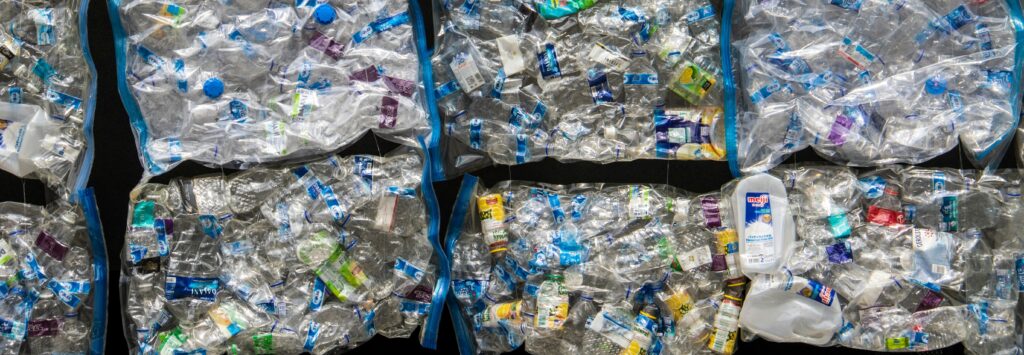Here is what you missed on plastics policy over the summer
It’s “la rentrée” in Brussels, as EU bubble staff are slowly trickling back into the city. But the summer break was anything but eventless for all things plastic. From Global Plastic Treaty talks in Geneva to European Commission proposals on chemical recycling – our blog post has got you covered.
What you need to know about the Global Plastics Treaty
For almost two weeks, country delegates from around the world met in Geneva to attempt to finalize negotiations on a new Global Plastics Treaty. But following a fraught negotiating process heavily influenced by petrostates and the petrochemical industry, the negotiation collapsed without an agreement. The resumed fifth meeting of the Intergovernmental Negotiating Committee (INC-5.2) was adjourned, but ended without a clear agreement on the path forward.
Petrostates and the fossil fuel lobby sabotage the process
The talks were effectively held hostage by the vested interests of petrostates and the petrochemical industry. Despite only being a small group of countries within the UN plenary, delegates from a handful of oil- and plastic-producing countries—Saudi Arabia, Russia, and the United States, among others–refused to compromise. Instead, they used delay tactics, procedural stonewalling, and flat-out refusal to engage in substance to derail progress and block any attempt at advancing an ambitious treaty. Their obstruction was reinforced by the unprecedented presence of fossil fuel and petrochemical lobbyists that flocked to Geneva (234+ registered lobbyists by conservative estimates), outnumbering the combined diplomatic delegations of all 27 European Union countries and the European Commission combined (233 delegates). Unfortunately, their sabotage attempts were successful as the negotiations fell flat without agreement on a path forward.
It wasn’t all doom and gloom
Despite the stalemate, we witnessed some encouraging developments and reasons for cautious optimism. Undeterred by the destructive efforts of petrostates, the majority of countries came together and reached stronger alignment. Discussion documents submitted by countries during the negotiation sessions, known as “Conference Room Papers”, show that there is now more convergence on the text, specifically on the key issues of production, chemicals and products, finance, as well as future decision-making. Moreover, a majority of countries supported a stand-alone article on health, reflecting wide recognition of the impacts of plastics on human health throughout their lifecycle.
“Courage for your communities. You hold the power. You have the duty. Protect our children and our future.”
Despite lack of space for meaningful participation, or even interventions, and restricted access throughout the process, civil society, scientists, Indigenous Peoples, frontline and fenceline communities, waste pickers and workers made sure their voices were heard. Since the beginning of this process three years ago, they have been instrumental in shifting the narrative on plastic pollution – moving from a narrow focus on marine litter to a widespread affirmation that plastic pollutes throughout its entire life cycle. Their presence in Geneva highlighted countries’ duty to place human health and human rights at the core of the treaty negotiations.
What role did the EU play?
The EU played an indispensable role in Geneva as part of the group of ambitious countries that held the line on ambition, rejecting the watered-down draft texts presented by the Chair that would have rendered the treaty toothless. Its leadership played a vital role in ensuring ambition was kept alive on provisions around production, chemicals and health. But the task ahead demands even more. The EU must take a stronger role sitting at the table with emerging ambitious leaders like China, while recognising that its true strength lies in partnership and collaboration with the leaders from the Africa Group, Pacific group and the Group of Latin American countries who have carried ambition from the start. By combining bridge-building with concrete proposals, the EU can help deliver the strong and operational treaty the world urgently needs.
Next steps unclear, but ambition must remain high
At the current moment, it is still unclear what the next steps in the process are. Another INC session may be convened, though it has become clear this could only be successful if the process is changed. Some call on ambitious countries to leave the UN process and to take the negotiations further with a “treaty of the willing” outside the UN context. No matter which avenue is chosen, the EU must stand united and work towards ensuring unity within the group of ambitious countries. It has a key role to play, building bridges and not creating unnecessary rifts between ambitious countries. It must take the initiative to make concrete propositions on how to move forward, including on defining a process that is truly operational and achieves the goal of agreeing on an ambitious treaty.
Read more from our members:
- Civil society perseveres in the face of a deeply flawed Plastics Treaty negotiations process and demands that countries take decisive action
- Petrostates torpedo Global Plastics Treaty – profits over planet as talks collapse again – EIA
- CIEL Staff React to End of Resumed Fifth Plastics Treaty Talks – Center for International Environmental Law
- The Global Plastics Treaty: to be or not to be* – Zero Waste Europe

Catching up on the Commission’s Chemical Recycling plans
In July, the European Commission launched a public consultation on its proposed rules for calculating, verifying and reporting recycled content in single-use plastic (SUP) beverage bottles. The Commission intends for the adoption of these rules to enable chemical recycling in the EU, hoping that it will help economic actors meet the recycled content targets set under the Single-Use Plastics Directive (SUPD). However, more and more studies show that chemical recycling is a problematic technology. In our Rethink Plastic response to the consultation, we urge the Commission to be careful not to create a precedent for recycled content targets that relies on these questionable technologies.
Not all recycling processes are equal
The landmark Single-Use Plastics Directive introduced recycled content targets for plastics for the first time in the EU legislation, establishing that by 2030, plastic beverage bottles should contain at least 30% recycled content. In a previous Implementing Decision, the Commission had established that these recycled content targets should be reached exclusively through the use of mechanical recycling technologies. The term “mechanical recycling” refers to the process in which plastic waste is collected, sorted, broken down into smaller pieces, and then turned into new products without changing its chemical structure. This technology is long-established and well-suited to recycle the most prevalent types of plastic beverage containers – PET bottles. While reduction and reuse measures must be at the heart of the EU policies, mechanical recycling does have a place in a well-functioning circular economy.
Chemical Recycling – too good to be true?
The Commission’s 2025 proposal, however, repeals the previous restriction to mechanical recycling and aims to promote “additional and innovative recycling” methods, in particular chemical recycling. Chemical recycling is an umbrella term for several processes that change the chemical structure of plastic waste. The different processes can be classified into two main categories: depolymerisation and thermocracking. Depolymerisation relies on a chemical reaction in which polymers are chemically broken down to monomers. The second category – thermocracking – is based on a heating process that affects the chemical composition of plastic waste and should be seen as a recovery process rather than as a form of recycling. In limited instances, this plastic waste can be used to produce new polymers and plastics, but in most cases, plastic is simply turned into fuel and then burned, releasing greenhouse gas emissions into the atmosphere. The two main types of thermocracking are gasification and pyrolysis.
Even though the Commission’s proposal heavily promotes “Chemical Recycling”, it does not actually define what it means by this. However, many of the provisions in its proposal appear to be referring to pyrolysis, suggesting that the Commission is promoting this technology. This is problematic because the low yield and high levels of emissions associated with pyrolysis make it closer to a recovery process than a genuine recycling technology. It is therefore ill-suited to help Member States reach their recycled content targets while its associated pollution endangers the EU’s transition to a clean and toxic-free circular economy.
The many issues with Chemical Recycling
While the (petro-)chemical industry has been heavily promoting chemical recycling as a viable and sustainable technology to boost the circularity of plastic, the reality is that its capacity to actually create new plastics is severely limited, and the safety of the process is yet to be assessed. Furthermore, the negative environmental impact of thermocracking processes, such as pyrolysis and gasification, is immense. These processes require high energy inputs, while generating a lot of losses, and they emit, on average, nine times more greenhouse gas emissions than mechanical recycling and more, even, than almost all forms of primary plastic production.
Given these concerns, the Rethink Plastic Alliance’s feedback urged the Commission to:
- Ensure recycled content only comes from post-consumer waste in line with the principle of effectiveness.
- Ensure consistency with other EU legislation, including on waste and chemicals. Concretely, this means:
- Complying with the definition of recycling as established under the Waste Framework Directive by removing the possibility of recovering materials, as well as removing the concept of “dual-use output” and the definition of “recycling pathway”;
- Changing the definition of “chemical building blocks” to “intermediates” as defined under REACH;
- Enabling proper chemical traceability along the value chain to ensure a safe circular economy;
Civil society participation weakened in the face of strong influence from chemicals industry
This consultation was launched in early July and closed in mid-August, giving stakeholders only a few weeks in the middle of the EU summer break to respond to its proposal. This timing is not conducive to effective participation, especially for civil society organisations who must often internally consult their members for input. To ensure the robust participation of civil society in EU decision-making, future consultations should run for longer periods and not take place during the traditional holiday period.
The proposal was published in the context of the Chemical Industry Action Plan and presented as an enabling factor for the chemical industry to facilitate the “transition to circularity by encouraging the use of alternative feedstocks and reducing dependencies on virgin fossil resources”. It seems that the primary goal of the Implementing Act is no longer to address the plastic pollution crisis. Instead, the goal is now to explicitly support the chemical industry. This development reflects the growing prominence and influence of the (petro-) chemical industry that we have been witnessing in the past year in decision-making related to the environment and health, and it is a cause for concern.
Next steps
The Commission is now assessing the feedback it received from various stakeholders in the consultation and will send a proposal to Member States’ experts for approval. The Rethink Plastic Alliance will follow the evolution of this proposal closely and continue to engage at every opportunity.



